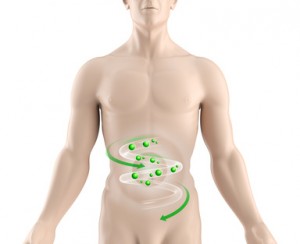Contents
What is tryptophan?
The proteinogenic amino acid tryptophan is essential in the human body and has an aromatic structure.
Like phenylalanine, histidine and tyrosine, its structure contains an indole functional group. This means that the body cannot produce it, so tryptophan needs to be part of our diet. It is therefore an essential amino acid.
Tryptophan is heat resistant and does not dissolve in water. As a result we only lose a small amount during the cooking process. The daily requirement for tryptophan differs from person to person, therefore it is difficult to estimate the daily dietary requirements.
However supplements are in popular demand due to unhealthy eating habits, too much stress and too little time to meet the dietary requirements.
Dietary sources
Soy beans contain a particularly large amount of L-tryptophan (around 590mg per 100g). Other sources rich in tryptophan include cashew nuts, walnuts, unsweetened cocoa powder, oats, eggs, peas and salmon.
A healthy adult consumes around 3.5mg to 6mg of tryptophan per kilogram of body weight through food every day. However there can be large differences in the actual needs of individuals 1. Therefore it is good to include different sources of tryptophan as part of a healthy balanced diet. This minimises the chances of becoming deficient in this amino acid. Tryptophan deficiency is more likely when there is a problem with gut absorption. This can be the result of diseases such as inflammatory gastrointestinal disorders or liver damage. In these cases there is a greater risk of complications.
Breakdown of tryptophan content in foods
Food does not contain L-tryptophan in free form; it is bound up in protein. In every 100g of food, the following amounts of total protein and L-tryptophan are present:
| Food | Total Protein | L-tryptophan | L-tryptophan % of Protein |
| Soybeans | 36.5 % | 590 mg | 1.6 % |
| Cocoa powder (without sugar) | 19.6 % | 293 mg | 1.5 % |
| Cashew nuts | 18.2 % | 287 mg | 1.6 % |
| Chicken breast (raw) | 21,2 % | 267 mg | 1.3 % |
| Peas (dried) | 24.6 % | 266 mg | 1.1 % |
| Pork (raw) | 21.0 % | 220 mg | 1.1 % |
| Salmon (raw) | 20.4 % | 209 mg | 1.0 % |
| Oats | 13.2 % | 182 mg | 1.4 % |
| Walnuts | 15.2 % | 170 mg | 1.1 % |
| Chicken egg | 12.6 % | 167 mg | 1.3 % |
| Brown rice | 7.9 % | 101 mg | 1.3 % |
| Corn flour | 6.9 g | 49 mg | 0.7 % |
| Cow’s milk (3.8% fat) | 3.3 g | 46 mg | 1.4 % |
Tryptophan in the diet is chemically bonded therefore the body can only absorb a fraction of the total amount. There are no special precautions when preparing food as this amino acid is both heat and water resistant.
Health benefits of tryptophan
Mood and anxiety
L-tryptophan plays a crucial role in lifting mood. This is the body converts this amino acid into serotonin. This is a neurotransmitter which is famous as the ‘happy hormone’ in our brain. A deficiency in tryptophan can lead to erratic mood swings, serious anxiety disorders and even depression.
Reducing appetite
Serotonin reduces appetite, so a sufficient concentration can help in weight loss. Specially manufactured nutritional supplements are available for this. Ideally you should take these in addition to improving your diet to get the best results. Competitive athletes also benefit from the consumption of supplements containing L-tryptophan, as these can increase physical fitness and thus improve training results.
A further important function of L-tryptophan is supporting the synthesis of niacin (vitamin B3) through its role as a provitamin. Niacin is involved in the metabolism of carbohydrate, protein and fat and thus ensures an energy supply for the body. Furthermore, vitamin B3 is necessary for the synthesis of some neurotransmitters and messengers, enabling the transmission of stimuli in the brain. As a component of many different proteins, L-tryptophan is also indirectly involved in many enzymatic reactions. In this way, it helps build different tissues through the so-called ‘structural proteins’.
Effects on sleep pattern
New findings have shown that tryptophan can help you get a good night’s sleep. It keeps the level of serotonin fairly constant during the day. As a result, sufficient melatonin can be produced from this serotonin at night. This hormone significantly influences our sleep cycle and is necessary for restful sleep. Low concentrations of L-tryptophan can therefore cause problems falling asleep and even insomnia, and can considerably worsen our general state of health.
Medical uses
As L-tryptophan has lots of positive effects on the human body, it can be beneficial in certain medical conditions. Several studies have investigated this and the results are promising.
A study in 2010 examined how L-tryptophan can halt the spread of steatohepatitis, a form of liver disease. The study was based on the formation of oxidative stress and inflammatory reactions. After only four weeks, participants in the study who had received special supplements every day had an improvement in their levels of triglycerides and available inflammatory cytokines 2.
Furthermore, this essential amino acid has positive effects on irritable bowel syndrome (IBS) 3.
The less L-tryptophan there is in the body, the more serious the symptoms of this condition. Therefore L-tryptophan may be helpful in reducing the severity of irritable bowel syndrome.
Finally, tryptophan can be useful in combating depression. It is used as an antidepressant with limited side effects 4.
L-tryptophan as an amino acid preparation is not legally available in Germany, as it is viewed as a pharmaceutical drug. It is available in Austria and Switzerland on prescription.
Conclusion
Tryptophan is an important natural mood-lifting substance and it is converted into serotonin, the ‘happy hormone’. Targeted supplements containing this essential amino acid can also encourage weight loss and help overcome sleep disorders. Moreover, L-tryptophan has a key role in metabolism, energy production and as a precursor of important chemicals. In recent years it has gained recognition as an important remedy in orthomolecular medicine.
Studies
- G. Lazaris-Brunner, M. Rafii, R. O. Ball, P. B. Pencharz: Tryptophan requirement in young adult women as determined by indicator amino acid oxidation with L-(13C) phenylalanine. In: Am. J. Clin. Nutr. 68(2); Aug 1998: S. 303-10 ↩
- Cichoz-Lach H. et al.: The effects of L-tryptophan and melatonin on selected biochemical parameters in patients with steatohepatitis; J Physol Pharmacol 2010 Oct; 61(5): 577-580 ↩
- Fitzgerald P et al.: Tryptophan catabolism in females with irritable bowel syndrome: relationship to interferon-gamma, severity of symptoms and psychiatric co-morbidity; Neurogastroenterol Motil 2008 Sep 17 ↩
- Roiser JP, Levy J, Fromm SJ, Nugent AC, Talagala SL, Hasler G, Henn FA, Sahakian BJ, Drevets WC. The effects of tryptophan depletion on neural responses to emotional words in remitted depression. Biol Psychiatry. 2009 Sep 1;66(5):441-50. Epub 2009 Jun 17 ↩





